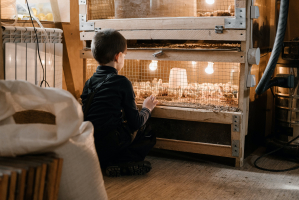Top 10 Expository Essay Topics for High School Students and Samples
Exploring engaging and thought provoking expository essay topics for high school students opens doors to creative expression and critical thinking. From ... read more...dissecting societal challenges to delving into personal experiences, these topics offer a platform for students to articulate their ideas with clarity and depth.
-
Essay topic: What is an acceptable level of sadness?
Answer:
In our fast-paced world, technology has become like a helpful friend, always there to assist and make life easier. From smartphones to social media, its influence is all around us, shaping the way we communicate, work, and live.
Firstly, let's talk about how technology affects the way we talk to each other. With smartphones and social media, we can connect with friends and family no matter where they are. It's like having the whole world in our hands. This is great because it allows us to share our thoughts and experiences with people from different places. However, it also raises concerns about privacy. When we share so much online, are we giving away too much of ourselves?
Moving on to the second point, technology has changed the way we work and do business. Think about how machines and computers have made things faster and more efficient in industries like manufacturing and finance. This is good for productivity, but some worry it might take away jobs from people. So, while technology helps us work better, it also brings up questions about the future of jobs and the skills we need to learn.
Lastly, let's talk about the big picture. Technology has not just changed our personal lives and jobs; it's influencing how we deal with big global problems. For example, we can use technology to work together on issues like climate change and health crises. But as we do this, we must be careful about the impact on our environment and make sure everyone benefits.
In conclusion, technology is like a double-edged sword. It brings great things, but we also need to be mindful of its challenges. As we navigate this tech-filled world, let's think about how we can use it for good. By discussing and making wise choices, we can ensure that technology becomes a positive force for all of us.
Photo by Pixabay via pexels 
Photo by Pixabay via pexels -
Essay topic: Can dogs smell fear?
Answer:
Have you ever wondered if your furry friend can really sniff out your feelings? It turns out, our canine companions may have a remarkable ability to pick up on human emotions, including fear.
To begin with, dogs have an extraordinary sense of smell. Their noses are like superhero sniffers, capable of detecting scents at levels far beyond our human capabilities. This incredible skill is what allows them to notice changes in our body chemistry, such as when we feel afraid.
When a person is afraid, their body releases certain chemicals and hormones. Dogs, with their super-sensitive noses, can catch a whiff of these changes. This doesn't mean they can literally smell the emotion of fear itself, but rather the physical reactions that come with it. It's like they're reading the chemical signals our bodies send out when we're scared.
Supporting this idea are numerous studies showing that dogs react differently to people displaying various emotions. They can sense when we're happy, sad, or anxious. It's as if they have a built-in emotion radar!
Analyzing this evidence, it's clear that while dogs may not exactly "smell" fear like a familiar scent, they can pick up on the subtle changes in our chemistry associated with fear. This unique ability likely stems from the strong bond and communication that has developed between humans and dogs over thousands of years.
In conclusion, our four-legged friends may not be mind readers, but they sure seem to have a nose for emotions. The next time you're feeling a bit anxious, pay attention to your dog's behavior – you might just find them offering some extra cuddles and comfort, proving that our canine pals are indeed attuned to the subtleties of our feelings.
Photo by muhannad alatawi via pexels 
Photo by Helena Lopes via pexels -
Essay topic: Is it important to read the book before watching the movie?
Answer:
Have you ever faced the dilemma of choosing between reading the book or watching the movie? It's a question that many of us ponder, and the answer isn't always as simple as it seems.
Firstly, let's consider the importance of reading the book before watching the movie. Books, with their detailed descriptions and rich narratives, offer a unique and immersive experience. When we read the book first, our imagination gets to work, creating vivid images and characters in our minds. This allows us to form a deep connection with the story, understanding the characters' thoughts and feelings in a way that movies sometimes struggle to capture.
Supporting this idea is the fact that books often contain more details and background information than movies can cover in their limited time. Reading the book first provides a comprehensive understanding of the plot and characters, enhancing the overall enjoyment of the story.
On the other hand, some argue that watching the movie first can be equally enjoyable. Movies, with their visual effects and soundtracks, bring stories to life in a different way. For visual learners or those with limited time, a movie can provide a quick and entertaining overview of the story. However, it's essential to acknowledge that movies might simplify or omit certain details from the book, potentially leading to a less nuanced understanding of the narrative.
In conclusion, whether to read the book before watching the movie depends on personal preferences. If you enjoy diving deep into the intricate details of a story and forming a strong connection with characters, reading the book first might be the way to go. However, if time is of the essence, or you prefer a visual and cinematic experience, starting with the movie could be just as enjoyable. Ultimately, the choice is yours, and the most important thing is to savor the story in a way that brings you the most joy and satisfaction.
Photo by Roberto Nickson via pexels 
Photo by cottonbro studio via pexels -
Essay topic: Do aliens exist?
Answer:
Have you ever looked up at the night sky and wondered if we're alone in the vast universe? The question of whether aliens exist has fascinated humans for a long time, and it's a topic that sparks curiosity and imagination.
Firstly, let's explore the idea that aliens might be out there in the universe. Space is unimaginably vast, with billions of galaxies, each containing countless stars and planets. Some scientists believe that, given the sheer number of celestial bodies, the possibility of other forms of life is quite high. They argue that conditions suitable for life could exist on planets beyond our solar system.
Supporting this idea is the discovery of exoplanets – planets that orbit stars outside our solar system – some of which are found in the "habitable zone," where conditions for life as we know it could be possible. While these findings are exciting, it's essential to note that we haven't yet found definitive evidence of alien life.
On the other hand, skeptics argue that the vastness of the universe doesn't guarantee the existence of extraterrestrial beings. They point out that the conditions required for life, as we understand them, might be rare and unique to Earth. Additionally, the lack of concrete evidence, despite advancements in space exploration, leaves the question of aliens largely unanswered.
In conclusion, the existence of aliens remains one of the great mysteries of the cosmos. While scientists continue to search for signs of extraterrestrial life, conclusive evidence is yet to be found. Whether you're a believer in the possibility of life beyond Earth or a skeptic, the exploration of this cosmic question adds a touch of wonder to our understanding of the universe. As we look to the stars, the answer to the age-old question of whether aliens exist remains elusive, inviting us to continue our quest for knowledge among the mysteries of the cosmos.
Photo by cottonbro studio via pexels 
Photo by cottonbro studio via pexels -
Essay topic: Do people really change with time?
Answer:
Have you ever thought about whether people truly change as time goes by? It's a question that touches on the essence of human nature and the ongoing journey of self-discovery.
To begin, let's consider the idea that people indeed undergo changes over time. Life is like a journey, and as we navigate through different experiences, we learn, grow, and adapt. The things that once seemed important may shift, and our perspectives evolve. For example, someone who was shy in high school might become more outgoing as they face new challenges and meet different people in college or the working world.
Supporting this notion is the concept of personal development. As we accumulate life experiences, we often gain new skills, insights, and a deeper understanding of ourselves. It's like adding layers to our personality, shaping who we are becoming. This process of change is natural and is often influenced by our surroundings, relationships, and the lessons we learn along the way.
On the other hand, some argue that certain core aspects of a person remain constant. While individuals may mature and adapt, their fundamental values and character traits might endure. For instance, someone with a strong sense of empathy may continue to prioritize compassion and understanding throughout their life.
In conclusion, the question of whether people change with time is complex and multifaceted. While experiences can lead to personal growth and transformation, certain elements of who we are may remain steadfast. The journey of change is unique for each person, influenced by a combination of internal and external factors. Embracing the evolving nature of ourselves and those around us adds depth to the human experience, reminding us that life's journey is an ongoing process of discovery and growth.
Photo by Pixabay via pexels 
Photo by Andrea Piacquadio via pexels -
Essay topic: How big is the universe?
Answer:
Have you ever gazed up at the night sky and wondered about the immense size of the universe? It's a question that has intrigued scientists and dreamers alike, prompting us to explore the boundaries of our cosmic home.
To start, let's ponder the enormity of space. The universe is unimaginably vast, stretching out in all directions beyond what our eyes can see. It's like an endless sea of stars, galaxies, and cosmic wonders. Scientists estimate that the observable universe, the part we can detect with our telescopes, is about 93 billion light-years in diameter.
Supporting this idea is the concept of galaxies – vast collections of stars, planets, and cosmic matter. Our Milky Way is just one among billions of galaxies in the observable universe. Each galaxy, in turn, hosts billions or even trillions of stars, each with the potential for planets and other celestial bodies.
Despite our attempts to fathom the vastness of the universe, there are limits to what we can observe. Some parts of space are so far away that their light hasn't reached us yet, making them beyond our current reach of exploration.
On the other hand, skeptics may question the practical understanding of such vast measurements. The sheer size of the universe can be challenging to comprehend, and some argue that our human minds may struggle to grasp the full extent of its enormity.
In conclusion, the universe is a colossal expanse that challenges the limits of our imagination. The vastness of space, filled with galaxies, stars, and mysteries, invites us to contemplate our place in this cosmic tapestry. As we look to the stars, the question of how big the universe truly is remains a captivating and humbling exploration, reminding us of the boundless wonders that exist beyond our earthly home.
Photo by Pixabay via pexels 
Photo by Jacub Gomez via pexels -
Essay topic: How can we develop our imagination?
Answer:
Have you ever wondered how to make your imagination soar to new heights? Unlocking the power of imagination can be a fun and rewarding journey, allowing us to explore new ideas and perspectives.
To begin, let's consider the importance of curiosity. Curiosity is like a spark that ignites our imagination. By asking questions, seeking answers, and being open to new possibilities, we can fuel our creative thinking. Take a moment to wonder about the "what ifs" and "whys" of the world around you – it's a simple yet effective way to kickstart your imagination.
Supporting this notion is the idea of reading. Books are magical portals that transport us to different worlds and perspectives. When we dive into a good book, our minds create vivid images, and we can imagine ourselves in far-off places or alongside fascinating characters. Whether it's fiction or non-fiction, reading broadens our imagination and helps us think beyond our everyday experiences.
Another way to develop our imagination is through the arts. Drawing, painting, writing, or even acting are expressive outlets that encourage creativity. These activities allow us to bring our thoughts and ideas to life, fostering a sense of imagination and innovation. Don't worry about being perfect – the joy is in the process of creating.
On the other hand, some might argue that technology, with its constant distractions, hinders our imagination. While it's true that too much screen time can limit our creative thinking, using technology mindfully can open up new avenues for imaginative exploration. Educational apps, virtual experiences, and online resources can be tools for expanding our understanding of the world.
In conclusion, developing our imagination is a journey filled with discovery and wonder. By embracing curiosity, engaging with books, and exploring the arts, we can nurture our creative thinking. Imagination is like a muscle – the more we exercise it, the stronger and more vibrant it becomes. So, let your imagination take flight, and who knows what amazing ideas and adventures you might discover along the way!
Photo by Josh Hild via pexels 
Photo by Andrea Piacquadio via pexels -
Essay topic: How can one measure happiness?
Answer:
Have you ever wondered how to gauge the happiness in your life? While happiness is a feeling that varies from person to person, there are ways to explore and measure the joy that fills our days.
To begin, consider the importance of self-reflection. Taking a moment to pause and think about your feelings can provide insights into your happiness. Ask yourself what activities bring you joy, who contributes positively to your life, and what moments make you smile. This introspection helps in understanding personal sources of happiness.
Supporting this idea is the concept of gratitude. Keeping a gratitude journal, where you jot down things you are thankful for each day, can be a simple yet effective way to measure happiness. Recognizing and appreciating the positive aspects of life, even small ones, can contribute to a sense of contentment and well-being.
Another way to measure happiness is by examining social connections. Meaningful relationships and a sense of belonging are often linked to happiness. Consider the people around you – friends, family, or even acquaintances who bring positivity into your life. The quality of relationships can serve as a valuable indicator of overall happiness.
On the other hand, some may argue that external factors like possessions or achievements are indicators of happiness. While external factors can contribute to momentary joy, true and lasting happiness often stems from internal fulfillment. It's the balance between external circumstances and internal contentment that creates a sustainable sense of well-being.
In conclusion, measuring happiness is a subjective and personal endeavor. Through self-reflection, gratitude, and fostering positive connections, we can gain a better understanding of the joy in our lives. Remember, happiness is not a fixed destination but a journey filled with moments of appreciation and connection. So, take a moment to reflect, appreciate the positive, and embrace the pursuit of happiness in your own unique way.
Photo by Ketut Subiyanto via pexels 
Photo by Lê Minh via pexels -
Essay topic: Consequences of having a job while in high school
Answer:
Have you ever thought about what happens when you take on a job while still in high school? While having a job can bring valuable experiences and extra income, it also comes with its own set of consequences that can impact various aspects of your life.
Firstly, let's explore the positive side. Having a job in high school can provide valuable life skills. It's like a crash course in time management and responsibility. Juggling school assignments and work schedules teaches you how to organize your time efficiently, a skill that will serve you well in the future. Moreover, having a job can boost your confidence and help you develop interpersonal skills as you interact with colleagues, customers, or clients.
Supporting this idea is the financial aspect. Earning your own money can be empowering and allows you to contribute to personal expenses or savings. It can be a stepping stone toward financial independence, teaching you the importance of budgeting and saving for future goals.
However, it's crucial to consider the potential consequences as well. One of the challenges is finding the right balance between work and school. Too many work hours can lead to exhaustion and negatively impact academic performance. It's essential to prioritize your studies and ensure that work commitments do not overshadow your educational responsibilities.
On the flip side, having a job may limit your participation in extracurricular activities or social events. Balancing work, school, and personal life can sometimes feel like a juggling act, and finding time for relaxation and socializing becomes crucial for overall well-being.
In conclusion, having a job while in high school can be a rewarding but challenging experience. The positive outcomes, such as skill development and financial independence, must be weighed against the potential consequences of time constraints and limited social engagement. It's essential to strike a balance that allows you to gain valuable experiences without compromising your academic and personal well-being. As you navigate the world of work and studies, remember that finding equilibrium is key to making the most of both aspects of your high school journey.
Photo by Tim Gouw via pexels 
Photo by Clem Onojeghuo via pexels -
Essay topic: Describe your first day at school
Answer:
Do you remember the butterflies in your stomach on the first day of school? Stepping into a new environment filled with unfamiliar faces can be both exciting and nerve-wracking. Let me share my experience of that unforgettable first day.
As I entered the school gates, a mix of emotions flooded over me. The unfamiliar corridors seemed like a maze, and I clutched my backpack a little tighter. The chatter of students echoed in the hallways, and I wondered how I would find my place in this sea of new faces.
The first bell rang, signaling the start of classes. My heart raced as I navigated the hallways to find my classroom. Each door seemed like a gateway to a new adventure. When I finally located my room, I took a deep breath before entering. The teacher, with a warm smile, welcomed me and introduced me to my classmates. The classroom buzzed with a sense of anticipation and curiosity.
Supporting this idea is the kindness of my fellow students. Although I was the new kid, my classmates went out of their way to make me feel welcome. They shared their favorite spots in the cafeteria, offered to partner with me in group activities, and even shared tips on navigating the school's daily routine.
As the day unfolded, my initial nervousness gradually transformed into a sense of belonging. I realized that everyone, at some point, had experienced the first-day jitters. The teachers and students created an inclusive atmosphere that eased my transition into this new chapter of my academic journey.
In conclusion, my first day at school was a mix of excitement and uncertainty. The unfamiliar surroundings and faces gradually became familiar, thanks to the welcoming gestures of my peers and teachers. That day marked the beginning of a journey filled with learning, friendships, and the discovery of a second home within the school walls.
Photo by Anastasiya Gepp via pexels 
Photo by Pixabay via pexels































